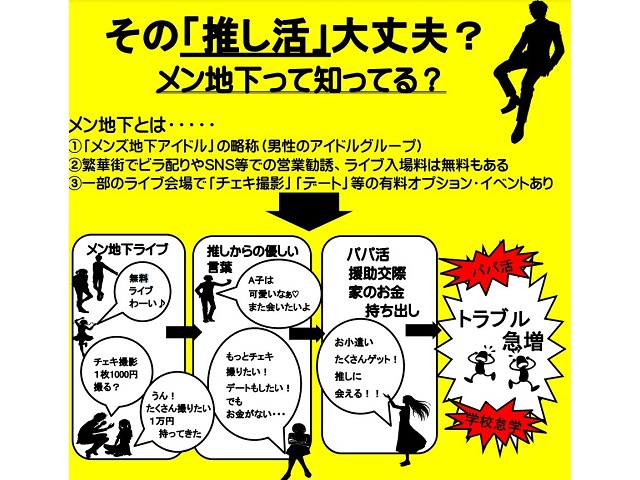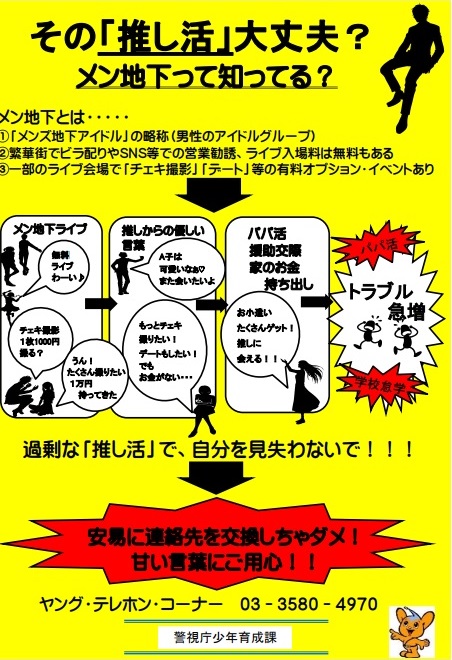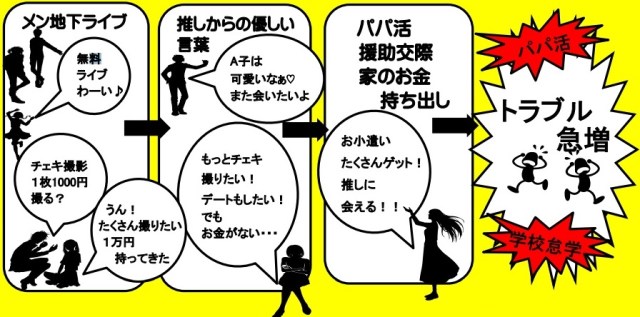
Police want kids and parents to be aware of the dangers of obsessive oshikatsu.
A lot of the youth-oriented public awareness posters and fliers made by the police in Japan deal with the same topics that concern parents in other countries. Always check for traffic before crossing the street. Say no to drugs. Be cautious of suspicious strangers. Things like that.
But there’s also a public service announcement from the Tokyo Metropolitan Police Department’s Juvenile Development Division that addresses a very Japanese issue: warning kids and parents about the danger of youths becoming obsessed with and exploited by idols.
“Is your oshikatsu safe?” asks the flier/poster, referring to activities related to having an oshi, or favorite idol. Specifically, the warning is about “menchika,” itself a shortened version of “men’s chika idol” or “underground male idol,” male idol singers who exist in the gray area between professional and amateur musician status.
As they haven’t yet achieved mainstream fame, admission to underground idols’ concerts tends to be inexpensive, or even free. There’s also a higher degree of direct interaction between performers and fans, due to the smaller scale of the events, which can create the feeling of a more meaningful bond between a fan and their oshi. However, the flier warns that this combination of factors can lead to trouble for young fans, since it’s common for underground idols to offer things like a chance to take photos together for a fee, and, according to the flier, even agree to going on a date with the fan for the right price.
The sequence of events pictured above starts with:
● Menchika concert
Fan: “Wow! Free concert!”
Idol: “You can take a Polaroid photo with me for 1,000 yen. How about it?”
Fan: “Yeah! I want to take a lot of pictures with you, so I brought 10,000 yen.”● Kind words from the oshi
Idol: “A-ko, you’re really cute! I want to see you again.”
Fan: “I want to take more photos with him! I want to go on a date! But I don’t have enough money…”
Up until this point, you could apply pretty much all of this scenario just as easily to boys who become infatuated with a female underground idol. The next part of the flow chart, though, highlights something that’s societally seen as a bigger threat to girls than boys, the temptation to turn to enjo kosai (“compensated dating”) or papakatsu (finding a sugar daddy) in order to get the money, so that they can then give to their favorite idol.
● Papakatsu, enjo kosai, and stealing money from home
Fan: “Now I’ve got lots of money to spend! I can see my oshi!!”● Trouble escalates
Papa katsu
Neglecting schoolwork
Of course, there are also plenty of ways to spend money on oshikatsu for famous idols too. However, with a major, mainstream unit, there are usually a few more layers of separation between fans and performers. With underground idols, not only is the interaction more direct, the perception by fans that their favorite is just on the cusp of making it big, and really needs that individual fan’s financial support specifically. Those factors can combine for a uniquely compelling argument that the young fan should be giving their oshi as much money as they can, so it’s probably a good idea for parents to be aware of the potential scenario and make sure their kids’ oshikatsu is OK.
Source: Tokyo Metropolitan Board of Education via Hachima Kiko
Images: Tokyo Metropolitan Board of Education
● Want to hear about SoraNews24’s latest articles as soon as they’re published? Follow us on Facebook and Twitter!



 Japan’s craziest burger chain takes menchi katsu to new extreme levels
Japan’s craziest burger chain takes menchi katsu to new extreme levels Starbucks Japan releases first-ever Hinamatsuri Girls’ Day Frappuccino
Starbucks Japan releases first-ever Hinamatsuri Girls’ Day Frappuccino Japanese restaurant chain serves Dragon Ball donuts and Senzu Beans this spring
Japanese restaurant chain serves Dragon Ball donuts and Senzu Beans this spring These creative, fanciful post boxes from Japan will delight you in so many ways【Photos】
These creative, fanciful post boxes from Japan will delight you in so many ways【Photos】 Tokyo street sweets: The must-snack treats of Nakano’s Refutei
Tokyo street sweets: The must-snack treats of Nakano’s Refutei Japan’s craziest burger chain takes menchi katsu to new extreme levels
Japan’s craziest burger chain takes menchi katsu to new extreme levels Starbucks Japan releases first-ever Hinamatsuri Girls’ Day Frappuccino
Starbucks Japan releases first-ever Hinamatsuri Girls’ Day Frappuccino Japanese restaurant chain serves Dragon Ball donuts and Senzu Beans this spring
Japanese restaurant chain serves Dragon Ball donuts and Senzu Beans this spring These creative, fanciful post boxes from Japan will delight you in so many ways【Photos】
These creative, fanciful post boxes from Japan will delight you in so many ways【Photos】 Tokyo street sweets: The must-snack treats of Nakano’s Refutei
Tokyo street sweets: The must-snack treats of Nakano’s Refutei Shakey’s is back! All-you-can-eat pizza chain returns to downtown Tokyo’s Shinjuku
Shakey’s is back! All-you-can-eat pizza chain returns to downtown Tokyo’s Shinjuku Starbucks Japan unveils new Sakura Frappuccino for cherry blossom season 2025
Starbucks Japan unveils new Sakura Frappuccino for cherry blossom season 2025 Sporty nerds gather in Nagano to show off their anime and manga-inspired snowboards
Sporty nerds gather in Nagano to show off their anime and manga-inspired snowboards Pokémon teams up with Hatsune Miku for first time, 18 new Poké-songs coming from virtual idol
Pokémon teams up with Hatsune Miku for first time, 18 new Poké-songs coming from virtual idol New Kumo Cloud Cake from Tokyo is the Japanese sweet on everyone’s lips right now
New Kumo Cloud Cake from Tokyo is the Japanese sweet on everyone’s lips right now Highest Starbucks in Japan set to open this spring in the Tokyo sky
Highest Starbucks in Japan set to open this spring in the Tokyo sky Tokyo Skytree turns pink for the cherry blossom season
Tokyo Skytree turns pink for the cherry blossom season Yakuzen ramen restaurant in Tokyo is very different to a yakuza ramen restaurant
Yakuzen ramen restaurant in Tokyo is very different to a yakuza ramen restaurant Japan Extreme Budget Travel! A trip from Tokyo to Izumo for just 30,000 yen [Part 1]
Japan Extreme Budget Travel! A trip from Tokyo to Izumo for just 30,000 yen [Part 1] Japan has only one airport named after a samurai, so let’s check out Kochi Ryoma【Photos】
Japan has only one airport named after a samurai, so let’s check out Kochi Ryoma【Photos】 Japanese drugstore sells onigiri at pre-stupid era prices, but how do they compare to 7-Eleven?
Japanese drugstore sells onigiri at pre-stupid era prices, but how do they compare to 7-Eleven? Burning through cash just to throw things away tops list of headaches when moving house in Japan
Burning through cash just to throw things away tops list of headaches when moving house in Japan Starbucks Japan releases new sakura goods and drinkware for cherry blossom season 2026
Starbucks Japan releases new sakura goods and drinkware for cherry blossom season 2026 Japan’s newest Shinkansen has no seats…or passengers [Video]
Japan’s newest Shinkansen has no seats…or passengers [Video] Foreigners accounting for over 80 percent of off-course skiers needing rescue in Japan’s Hokkaido
Foreigners accounting for over 80 percent of off-course skiers needing rescue in Japan’s Hokkaido Super-salty pizza sends six kids to the hospital in Japan, linguistics blamed
Super-salty pizza sends six kids to the hospital in Japan, linguistics blamed Starbucks Japan unveils new sakura Frappuccino for cherry blossom season 2026
Starbucks Japan unveils new sakura Frappuccino for cherry blossom season 2026 Foreign tourists in Japan will get free Shinkansen tickets to promote regional tourism
Foreign tourists in Japan will get free Shinkansen tickets to promote regional tourism The 10 most annoying things foreign tourists do on Japanese trains, according to locals
The 10 most annoying things foreign tourists do on Japanese trains, according to locals Take a trip to Japan’s Dododo Land, the most irritating place on Earth
Take a trip to Japan’s Dododo Land, the most irritating place on Earth Naruto and Converse team up for new line of shinobi sneakers[Photos]
Naruto and Converse team up for new line of shinobi sneakers[Photos] Is China’s don’t-go-to-Japan warning affecting the lines at a popular Tokyo gyukatsu restaurant?
Is China’s don’t-go-to-Japan warning affecting the lines at a popular Tokyo gyukatsu restaurant? Survey asks foreign tourists what bothered them in Japan, more than half gave same answer
Survey asks foreign tourists what bothered them in Japan, more than half gave same answer Japan’s human washing machines will go on sale to general public, demos to be held in Tokyo
Japan’s human washing machines will go on sale to general public, demos to be held in Tokyo Starbucks Japan releases new drinkware and goods for Valentine’s Day
Starbucks Japan releases new drinkware and goods for Valentine’s Day We deeply regret going into this tunnel on our walk in the mountains of Japan
We deeply regret going into this tunnel on our walk in the mountains of Japan Studio Ghibli releases Kodama forest spirits from Princess Mononoke to light up your home
Studio Ghibli releases Kodama forest spirits from Princess Mononoke to light up your home Major Japanese hotel chain says reservations via overseas booking sites may not be valid
Major Japanese hotel chain says reservations via overseas booking sites may not be valid Put sesame oil in your coffee? Japanese maker says it’s the best way to start your day【Taste test】
Put sesame oil in your coffee? Japanese maker says it’s the best way to start your day【Taste test】 No more using real katana for tourism activities, Japan’s National Police Agency says
No more using real katana for tourism activities, Japan’s National Police Agency says Shakey’s is back! All-you-can-eat pizza chain returns to downtown Tokyo’s Shinjuku
Shakey’s is back! All-you-can-eat pizza chain returns to downtown Tokyo’s Shinjuku Starbucks Japan unveils new Sakura Frappuccino for cherry blossom season 2025
Starbucks Japan unveils new Sakura Frappuccino for cherry blossom season 2025 Sporty nerds gather in Nagano to show off their anime and manga-inspired snowboards
Sporty nerds gather in Nagano to show off their anime and manga-inspired snowboards Pokémon teams up with Hatsune Miku for first time, 18 new Poké-songs coming from virtual idol
Pokémon teams up with Hatsune Miku for first time, 18 new Poké-songs coming from virtual idol New Kumo Cloud Cake from Tokyo is the Japanese sweet on everyone’s lips right now
New Kumo Cloud Cake from Tokyo is the Japanese sweet on everyone’s lips right now Eight unforgettable hot springs, as recommended by Japan’s “Professor Bath”
Eight unforgettable hot springs, as recommended by Japan’s “Professor Bath”